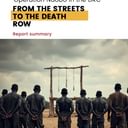
David G Silvers. Cancillería del Ecuador, 18 August 2014 via Wikimedia Commons
On April 16, 2024, the Biden Administration provided assurances to the United Kingdom that WikiLeaks founder Julian Assange, who is facing extradition to the United States on espionage charges, would not face the death penalty. A hearing is now scheduled in London on May 20 to evaluate the assurances and decide whether Mr. Assange has any remaining legal recourse. A few weeks earlier, the High Court in London granted Mr. Assange a reprieve from extradition, agreeing to grant him an appeal if the United States was unable to provide assurances that it would not seek the death penalty by April 16.
Although none of the 18 charges Mr. Assange is currently facing are capital, the possibility that he could be charged with a capital crime in the future means that his extradition would be unlawful. In the United Kingdom, extradition of prisoners to countries where they could face the death penalty is barred unless “adequate written assurance that the death penalty will not be imposed or, if imposed, will not be carried out,” according to the UK’s Home Office guidance on extraditions. In her 66-page judgement published on March 26, the president of the king’s bench division, Victoria Sharp, noted the need for explicit assurances regarding the intentions of U.S authorities, noting calls from U.S. elected officials to capitally charge Mr. Assange. The assurances provided now confirm that “a sentence of death will neither be sought nor imposed on Assange,” assuring that he will not be “tried for a death-eligible offense.”
U.S. authorities also agree that Mr. Assange, an Australian citizen, can “raise and seek” a defense under the First Amendment, but cautioned that “a decision as to the applicability of the First Amendment is exclusively within the purview of the U.S. Courts.” The UK High Court had specifically requested assurances “that the applicant [Mr. Assange] is permitted to rely on the first amendment, that the applicant is not prejudiced at trial, including sentence, by reason of his nationality, that he is afforded the same first amendment [free speech] protections as a United States citizen.”
Stella Assange, Mr. Assange’s wife, issued a statement after the U.S. assurances were made public. “[T]he US has limited itself to blatant weasel words claiming that Julian can ‘seek to raise’ the first amendment if extradited,” she said. “The diplomatic note does nothing to relieve our family’s extreme distress about his future – his grim expectation of spending the rest of his life in isolation in US prison for publishing award-winning journalism. The Biden administration must drop this dangerous prosecution before it is too late.”
For years, Australia has called upon the United States to drop the charges against Mr. Assange. On April 10, during an official visit with the Japanese prime minister, President Biden responded to a question about the request, stating, “We’re considering it.” Australian prime minister, Anthony Albanese told Sky News Australia the following day that, “I’m increasingly optimistic about an outcome, but one certainly has not been delivered yet. We’ll continue to argue the case at every opportunity that we have.” The Wall Street Journal had reported on March 20 that U.S. Justice Department was considering offering Mr. Assange a plea deal.
Haroon Siddique, US provides assurances to prevent Julian Assange appeal against extradition, The Guardian, April 16, 2024; Michael Holden and Kanishka Singh, Assange extradition moves closer as US provides UK court with assurances, Reuters, April 16, 2024; Ed Pilkington, Biden says he is ‘considering’ Australian call to drop Julian Assange charges, The Guardian, April 10, 2024; Aruna Viswanatha and Max Colchester, Julian Assange, Justice Department Exploring Guilty Plea to End 14-Year Legal Drama, The Wall Street Journal, March 20, 2024; Haroon Siddique, Julian Assange wins temporary reprieve in case against extradition to US, The Guardian, March 26, 2024; Michael Holden and Sam Tobin, Julian Assange wins temporary reprieve from extradition to US, Reuters, March 26, 2024


